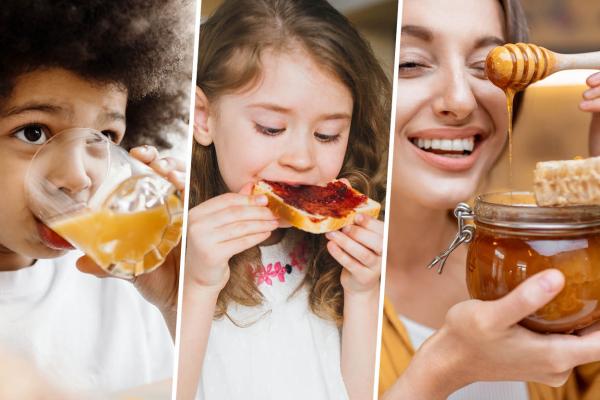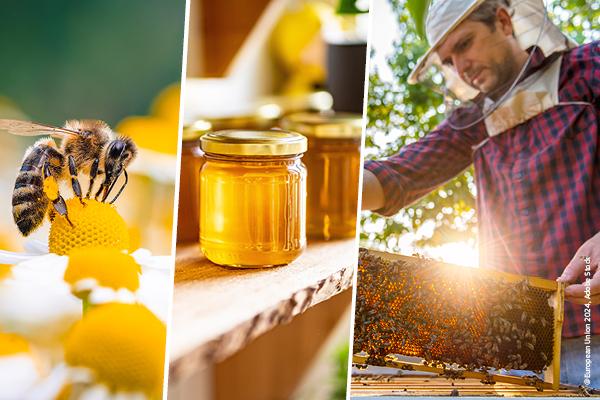Overview
Honeybee colonies are essential for agriculture and the environment. They ensure plant reproduction by pollination, whilst beekeeping contributes to the development of rural areas.
Beekeeping is practised in all EU countries and is characterised by diverse production conditions, yields and beekeeping practices. The EU is the second largest honey producer after China, but the EU is also a large net importer of honey from third countries. EU countries with the largest honey production (Romania, Spain, Hungary, Germany, Italy, Greece, France and Poland ) are mainly located in southern Europe, where climatic conditions are more favourable to beekeeping.
- 11 OCTOBER 2024
Rules on quality and labelling
The revised Honey Directive (2001/110) has come into force on 13 June 2024. All honey marketed in the EU must comply with the quality and labelling rules in this directive which sets out the definition and composition criteria for honey and other rules, in particular:
- It provides for mandatory origin labelling for honey. From 2026, the countries of origin in honey blends will have to appear on the label in descending order with the percentage share of each origin. EU countries will have the flexibility to require percentages for the four largest shares only when they account for more than 50% of the blend.
- It empowers the Commission to introduce harmonised methods of analysis to detect honey adulteration with sugar. A 3-year administrative arrangement is ongoing on harmonisation those testing methods at the Commission’s Joint Research Centre.
- It confers powers to the Commission to adapt the composition criteria for honey to ensure that it is not overheated, pollen is not removed from honey, and the methods are put in place to trace its geographical origin, including exploring the feasibility of EU-wide traceability system from beekeeper or importer to the final consumer.
The revised directive establishes the creation of a Honey Platform to advise the Commission on those matters.

- Press release
The European Commission welcomes the political agreement reached today by the European Parliament and Council to review and strengthen the existing marketing standards applicable to a honey, fruit juices, jams and milk.
EU Honey Platform
The Honey Platform is set up to:
- gather data for methods to improve authenticity controls of honey, in particular methods for the detection of adulteration in honey, with a view to possibly harmonising them;
- provide recommendations for an EU traceability system, with a view to tracing the honey back to the harvesting producer or importer;
- provide recommendations on the possible need to update the composition criteria and other quality parameters laid down in the Honey Directive;
- provide recommendations with a view to establishing a Union reference laboratory.
The Platform is composed of:
- representatives of the EU countries, competent authorities and designated laboratories;
- experts representing relevant stakeholders in the honey supply chain;
- experts representing civil society;
- experts appointed in a personal capacity who have proven knowledge and experience in the areas covered by the Honey Directive;
- experts representing academia, including universities, research institutes and other scientific organisations.
- 5 AUGUST 2024
EU support for the apiculture sector
The EU has been directly supporting beekeeping since 1997 through the common agriculture policy (CAP). Until the end of 2022, the support was provided through voluntary national apiculture programmes that were prepared and implemented by EU countries and aimed at improving the production and marketing of apiculture products.
Since 1 January 2023, the support for the sector is provided through apiculture interventions which are a mandatory part of CAP Strategic Plans for the 2023-27 period. These plans are designed at national level and set out how each EU country will channel support to achieve the CAP’s economic, environmental and social objectives.
Actions through CAP Strategic Plans
With CAP Strategic Plans, the scope of actions which can be supported through apiculture interventions was improved and broadened to the following 7 types of interventions as outlined in Regulation (EU) 2021/2115, Article 55(1):
- advisory services, technical assistance, training, information and exchange of best practices, including through networking, for beekeepers and beekeepers’ organisations;
- investments in tangible and intangible assets, as well as other actions, including for:
- combatting beehive invaders and diseases, in particular varroasis;
- preventing damage caused by adverse climatic events and promoting the development and use of management practices adapted to changing climate conditions;
- restocking of beehives in the EU, including bee breeding;
- rationalising transhumance;
- actions to support laboratories for the analysis of apiculture products, bee losses or productivity drops, and substances potentially toxic to bees;
- actions to preserve or increase the existing number of beehives in the EU, including bee breeding;
- cooperation with specialised bodies for the implementation of research programmes in the field of beekeeping and apiculture products;
- promotion, communication and marketing including market monitoring actions and activities aimed in particular at raising consumer awareness about the quality of apiculture products;
- actions to enhance product quality.
EU countries in cooperation with their beekeeping organisations are free to choose which of the available interventions to include in their CAP plan to address the specific needs and challenges of beekeeping in their countries. These are outlined in:
- Section 3.5.2 of the CAP Strategic Plan, together with an overview of the apiculture sector in the EU country concerned and the interventions chosen.
- Section 5.2 describes in detail the support provided under the specific apiculture interventions planned for the 2023-27 period, including their territorial scope, design of the intervention, eligibility criteria, forms and rates of support as well the planned outputs and financial allocations.
Overview of the CAP Strategic Plan approved by the European Commission for each EU country.

Catalogue of interventions
The online catalogue of CAP interventions provides an overview of all planned interventions by EU countries in their adopted CAP Strategic Plans for 2023-27. It allows users to search information on the interventions, including for apiculture interventions, using various filters.
- 7 JUNE 2024
Budget
The annual EU funding for the honey sector was substantially increased from EUR 40 million in 2019 to EUR 60 million as from 2021. From 2021 the EU contributions to each EU country were allocated as set out in Annex 10 to the CAP Strategic Plan Regulation (EU) 2021/2115.
These allocations were calculated on the basis of the number of beehives communicated in 2013 by EU countries in their apiculture programmes for 2014-16, adjusted by the applications for funding in the 2017-19 programming period as per Regulation (EU) 2021/580.
EU countries must provide at least 50% of funding as the EU financial assistance they use. However, they may also increase the rate of national co-financing to a maximum of 70%.
Legal bases
Regulation (EU) 2021/2115 establishing rules on support for CAP Strategic Plans, supplemented by Commission Delegated Regulation (EU) 2022/126 with additional requirements for certain types of intervention specified by EU countries in their CAP Strategic Plans for the 2023-27 period.
Regulation (EU) 1308/2013 establishing a common organisation of the markets in agricultural products, supplemented by Commission Delegated Regulation (EU) 2015/1366.
Committees
Various committees, composed of government representatives and chaired by a Commission representative, meet regularly to ensure that the Commission's responsibility for adopting implementing acts is exercised under the control of EU countries.
The Expert Group on the implementation of the CAP Strategic Plans Regulation discuss issues related to the implementation of the CAP Strategic Plans Regulation.
The Expert Group on Agricultural Markets discuss areas such as the evolution of market prices, production and trade in the EU and non-EU countries.
The civil dialogue group on animal production maintains the role of assisting the Commission in maintaining a regular dialogue on all matters related to beekeeping.
Related links
The civil dialogue group on animal products represents five sectors: beef and veal, pigmeat, poultrymeat and eggs, sheepmeat and goatmeat, and beekeeping.


